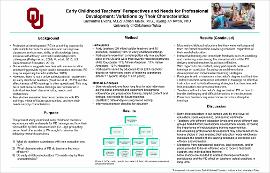| dc.description.abstract | BACKGROUND: Many early childhood programs offer various professional development opportunities in different formats for teachers (Guskey, 2003). However, the effectiveness of professional development trainings on teacher practices is often questioned (Son, Kwon, Jeon, & Hong, 2013). This could be due to trainings not being tailored to individual teachers’ characteristics, needs, and preferences. There have been few studies that examined teacher experiences with professional development trainings, their views on future training opportunities (Buell et al., 2000; Dunst & Raab, 2010) and an assessment of the teachers’ unique professional development needs. Thus, this phenomenological study examined early childhood teachers’ experiences with and needs for professional development trainings and how their views differ by their characteristics (i.e., age group they serve, level of education, teaching certification).
METHODS: Forty teachers from 14 early childhood settings were interviewed for an hour and completed a survey created for the Early Childhood Educator Workforce study. They came from diverse racial (17.1% African American, 43.9% Caucasian, 12.2% Hispanic, 17.1% Native American, 9.8% Biracial) and educational backgrounds (39.1% hold bachelor's degrees or higher). Participants had a range of teaching experiences with a mean of 11 years (SD = 9.27, range of 0.7 to 41.0). Participants were purposefully selected to participate by teaching in an infant/toddler or preschool classroom in a southwestern state. InVivo coding was used for data analysis as way to gain a better understanding of the participants’ perceptions on professional development.
RESULTS: Preliminary analysis using InVivo revealed 100% of participants found conferences, workshops, and coaching style trainings effective for learning. Desired content for future trainings varied by teachers’ characteristics. For example, needs for learning more about effective instructional and individualized learning strategies, including differentiating between student levels, individualized learning plans, and new activities for children, were prevalent among teachers with higher educational levels and infant and toddler teachers. How to handle challenging and difficult behaviors were the content focus for future trainings from non-bachelor's degree holding educators and non-certified teachers. Conscious discipline was identified as a desirable topic for preschool teachers.
CONCLUSION: Regardless of individual characteristics, all teachers believed more curriculum related training was needed and preferred an interactive hands-on approach to learning. From these results, we suggest professional trainings may be more effective in engaging early childhood teachers if they accommodate the situation, needs, and characteristics of teachers. | en_US |

